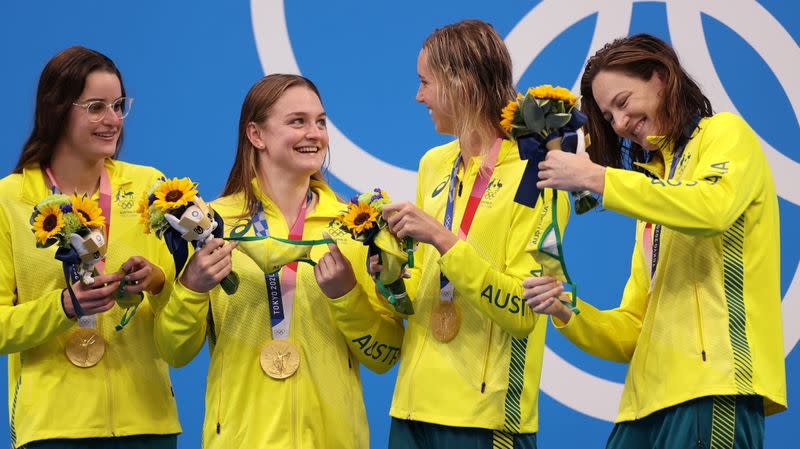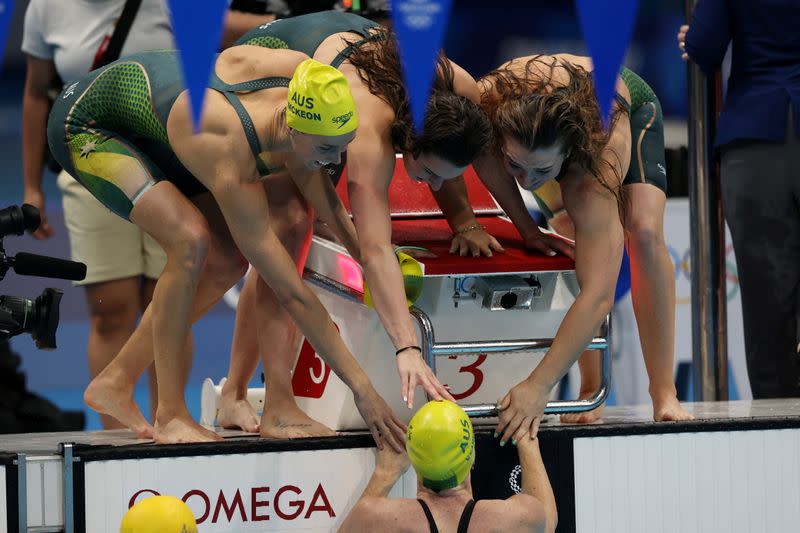Olympics-Swimming-Aussies' dive into 'data lake' brings success in Tokyo pool
By Hritika Sharma
(Reuters) - Australia's swim team head home from the Tokyo Games with a haul of nine gold medals - their best ever performance at the Olympics, partly thanks to a switch to a new data analytics system aimed at improving athletes' performances.
The 'Dolphins' were propelled to unprecedented success thanks to their women's team, led by Emma McKeon, Ariarne Titmus and Kaylee McKeown, who combined bagged eight gold medals, including the 4x100m freestyle and medley relays.
McKeon completed the sprint double, winning the 50m and 100m freestyle, before claiming two relay golds and surpassing Australian greats Ian Thorpe and Leisel Jones to become the country's most decorated Olympian with 11 medals.
Titmus bested American rival Katie Ledecky in the 200m and 400m freestyle, and McKeown took the 100m and 200m backstroke titles, while Zac Stubblety-Cook secured gold in the men's 200m breaststroke.
Two years before arriving in Tokyo, Swimming Australia entered into a partnership with cloud computing platform Amazon Web Services (AWS) to try to gain a competitive advantage by harnessing performance data more effectively.
That decision helped Australia's squad better the country's previous record tally of eight golds at Melbourne all the way back in 1956.
"In swimming, there isn't really a central database for results," Jess Corones, Swimming Australia's performance solutions manager, told Reuters.
"Normally, we'd have to look at four or five different websites to collate a really good global understanding of performance.
"What AWS allows us to do is automate that, because normally I'd have to sit there with three different screens and manually take that data off web pages and enter it into Excel spreadsheets."
The new approach was a hit with both athletes and coaches, allowing them to access AWS's dashboards on their mobile devices and track their progress in real time.
"Quite often," Corones said, "they'd come up to me and go, 'Can we get that Amazon thing out and have a look at the Amazon thing?'
"I think they find it really helpful as they can form a plan around it, and it gives them a better understanding of what they're trying to achieve."
Swimming Australia's data was integrated into a unified online depository called a "data lake", used by the team for the first time at an Olympics to select relay teams and predict those of their rivals, among other things.
"We've got a couple of applications that feed off the data lake," Corones said. "It's always a coaching decision, but (the data) provides more information to make the correct decision when we're selecting the team and what order to send them in.
"The data gave coaches direction and allowed them to make evidence-based decisions on what they're doing. So rather than just assuming, or guessing, the data's there to provide the evidence for their decision-making process."
The only major blemish in Australia's campaign was their women's team settling for bronze in the 4x200m freestyle relay, a result widely criticised over team selection.
But such was the success in Tokyo that Swimming Australia's direction looks to be firmly linked to the new data-driven approach.
"I think the mind boggles really at what (the data lake) is capable of," Corones added.
"It's just the foundation of what we're doing. It's a relatively new thing for us in swimming, but the things we want to do with that in the future are just endless."
(Reporting by Hritika Sharma in Bengaluru; Editing by Hugh Lawson)

 Yahoo Sport
Yahoo Sport 







































